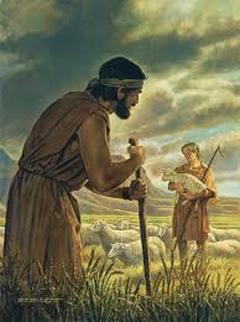
Let’s start with word prophet itself. What does it mean and how does someone get that title. The English word prophet in the Old Testament comes from the Hebrew word “nabiy” which means “spokesman” or “speaker”. The Greek word for prophet is “prophētēs”, which can mean “one who speaks forth” or “advocate.” Prophets are also called “seers,” because of their spiritual insight or their ability to “see” the future, as directed by God. Many people, both believers and nonbelievers call themselves prophets. This post will not try to identify, prove, or disprove any of the claims. That is something for another post or series of posts. So that us no question of a prophet’s identity in this blog series I will only write about people that are specifically identified as such in Scripture.
Let’s start with the first one, Abel.
The first prophet that we encounter in the Bible is Abel. We probably would not have thpught of Abel as a prophet if Jesus hadn’t identified him as one.
Luke 11:50-51 (NLT)50 “As a result, this generation will be held responsible for the murder of all God’s prophets from the creation of the world--51 from the murder of Abel to the murder of Zechariah, who was killed between the altar and the sanctuary. Yes, it will certainly be charged against this generation.
At “first blush” it doesn’t look like Abel meets the definition of someone who is a spokesperson, speaker, advocate, or seer but, we’ll look at that a little later. First a little about the man Abel.
Abel was the second son born to Adam and Eve and the first shepherd.
Genesis 4:1-2 (NLT)1 Now Adam had sexual relations with his wife, Eve, and she became pregnant. When she gave birth to Cain, she said, “With the LORD’s help, I have produced a man!”2 Later she gave birth to his brother and named him Abel. When they grew up, Abel became a shepherd, while Cain cultivated the ground.
Abel was also the world’s first martyr.
Genesis 4:3-5,8 (NLT)3 When it was time for the harvest, Cain presented some of his crops as a gift to the LORD.4 Abel also brought a gift—the best of the firstborn lambs from his flock. The LORD accepted Abel and his gift,5 but he did not accept Cain and his gift. This made Cain very angry, and he looked dejected. 8 One day Cain suggested to his brother, “Let’s go out into the fields.” And while they were in the field, Cain attacked his brother, Abel, and killed him.
That’s all we really know about Abel life.
 Cain and Abel
Cain and Abel
Why Was Abel A Prophet?
Remember the definition the Hebrew word for prophet comes from the Hebrew word “nabiy” which means “spokesman” or “speaker”, and the Greek word is “prophētēs” which can mean “one who speaks forth” or “advocate.”
Abel’s actions in presenting his sacrifice tells us that it’s important to obey God. It’s apparent that he knew what would please God because the scriptures tell us that his sacrifice was accepted and his brother’s wasn’t.
Genesis 4:4-5 (NLT)4 Abel also brought a gift—the best of the firstborn lambs from his flock. The LORD accepted Abel and his gift,5 but he did not accept Cain and his gift. This made Cain very angry, and he looked dejected.
The Bible tells us that Abel’s blood “cried out” to God.
Genesis 4:9-10 (NLT)9 Afterward the LORD asked Cain, “Where is your brother? Where is Abel?” “I don’t know,” Cain responded. “Am I my brother’s guardian?”10 But the LORD said, “What have you done? Listen! Your brother’s blood cries out to me from the ground!
Abel’s blood speaking out to God, in a sense, announced the consequences of Cain’s sin, and the fact that sin has consequences.
Genesis 4:6-7 (NLT)6 “Why are you so angry?” the LORD asked Cain. “Why do you look so dejected?7 You will be accepted if you do what is right. But if you refuse to do what is right, then watch out! Sin is crouching at the door, eager to control you. But you must subdue it and be its master.”
Genesis 4:11-12 (NLT)11 Now you are cursed and banished from the ground, which has swallowed your brother’s blood.12 No longer will the ground yield good crops for you, no matter how hard you work! From now on you will be a homeless wanderer on the earth.”
The writer of Hebrews also says that Abel in life and death speaks to us.
Hebrews 11:4 (NLT)4 It was by faith that Abel brought a more acceptable offering to God than Cain did. Abel’s offering gave evidence that he was a righteous man, and God showed his approval of his gifts. Although Abel is long dead, he still speaks to us by his example of faith.
Abel is identified as a righteous man who although dead still speaks by his example of faith.
We know very little of Abel but the little that we do know speaks volumes and he still speaks as one speaking the Word of God.

 RSS Feed
RSS Feed